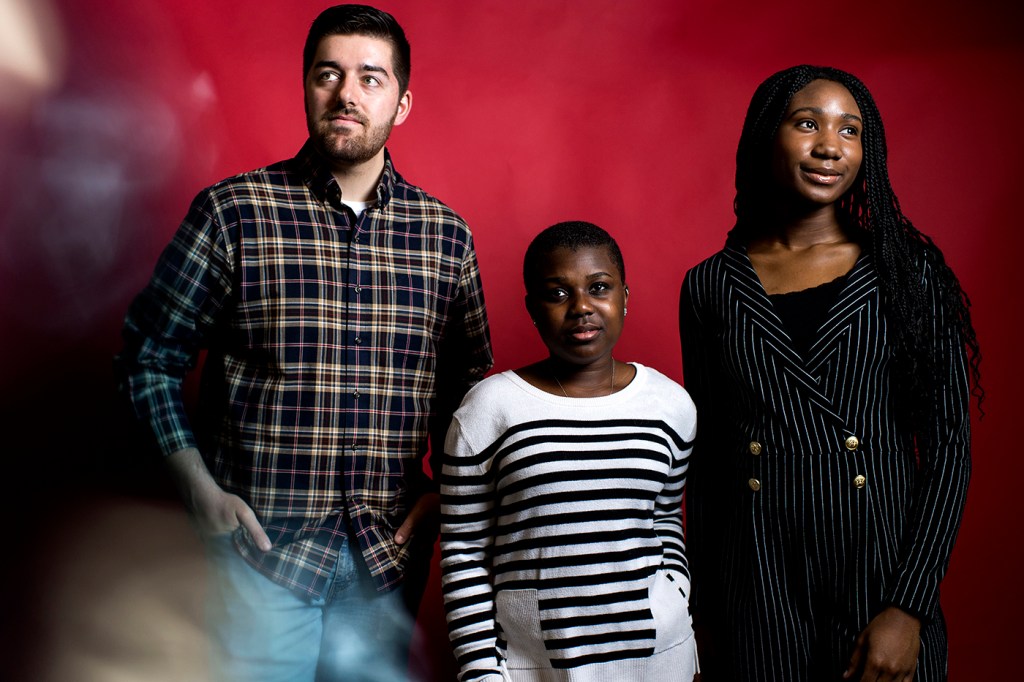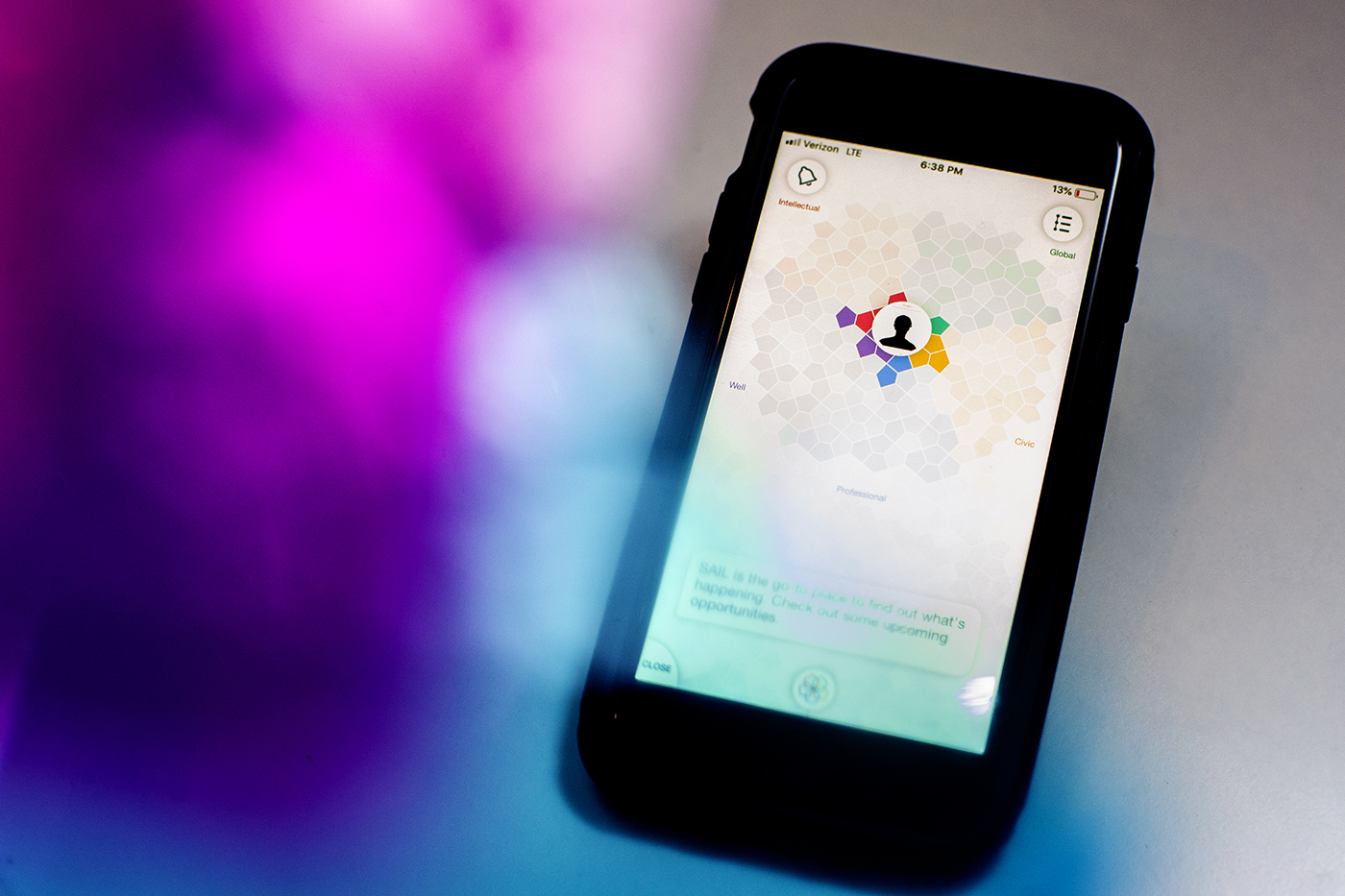SAIL, a new learning platform developed by Northeastern, helps students extract meaning from class, co-op, and everyday experiences

Whether they’re conducting research in Antarctica, working at a supply chain company in China, attending a lecture on the internet of things at Northeastern’s Seattle campus, or leading the Huskies to victory in a game in Boston, Northeastern students never stop learning through experience.

Now, the university has launched a new digital platform to help students, alumni, and lifelong learners document and track their personal and professional growth by cataloging their own learning experiences throughout their lives. Users can set learning objectives and use the reflective tool to find mentoring, networking advice, and feedback on courses, co-ops, and their life experiences.
The Self-Authored Integrated Learning platform, which is known as SAIL, was developed by a team of educators at Northeastern’s Center for Advancing Teaching and Learning Through Research with input from students, faculty, and staff.
“It’s experiential education in the sense that we are empowering the learner to really consider where they are in terms of their own skill sets, and then productively, strategically map out where they want to go in the future,” says Ken Henderson, Northeastern’s chancellor.
A tool for lifelong growth and success
Susan Ambrose, senior vice provost for educational innovation at Northeastern, says that SAIL helps students reflect on what they are learning in the moment, take inventory of the skills they are gaining from the experience, and then describe and transfer those skills to co-ops or their careers. For example, a resident assistant who continually mediates disputes between roommates might learn conflict management skills that he or she can apply to future life experiences.
Ambrose, who has played a critical role in envisioning SAIL and overseen the development and launch of the platform, says that students can also use SAIL as part of their effort to adapt to a workplace that is rapidly changing as a result of technological advancements, globalization, and shifting demographics.
It’s experiential education in the sense that we are empowering the learner to really consider where they are in terms of their own skill sets, and then productively, strategically map out where they want to go in the future.
Ken Henderson, Northeastern’s chancellor
“If I’m out in the workforce and I’m 60 years old and everybody else is younger, I may need to understand this generation and how it thinks, or I may need to understand people from a different culture, or I may need to understand how to use the latest technology,” Ambrose says. “Lifelong learning demands that people recognize what they don’t know, and that could be knowledge or skills, and then it requires that you figure out how to gain that knowledge or those skills, and then once you gain them, to monitor your understanding and ability to use them.”
Cigdem Talgar, the associate vice provost for teaching and learning at Northeastern, says that SAIL was developed to prepare learners to excel in an increasingly complex world. The platform, she says, will help students acquire the skills needed to be flexible and agile learners as they seize opportunities throughout their lives and careers.
“SAIL was developed to help students foster the skills necessary to recognize the learning potential of every experience and, in turn, integrate those experiences so that they can intentionally direct their future growth,” Talgar says.
What students and educators are saying about SAIL
Users of SAIL say it has helped them land the right co-op, map the skills they’ve learned on the job, make connections with alumni, organize their extracurricular activities, and find the appropriate language to describe their work experience in job interviews.
Colin Mullaney, a senior studying computer science and math, says that he’s used SAIL to look for co-op jobs and organize activities on campus. He has thought about using the platform to recruit freshmen for a mentoring group he created for computer science students.
“SAIL allows you to categorize different opportunities, such as a speaker event or co-op, into different skill sets,” says Mullaney. “Over time, you can see all the different skills you’ve developed.”
SAIL is a mindset about how we can engage our students at the fullest extent of their learning capacity so they’re not just acquiring knowledge and facts from us, but incorporating that learning experience into who they become as a well-rounded citizen of the world.
Rebecca Riccio, founding director of Northeastern’s Social Impact Lab
Miracle Olatunji, a first year business and communications student, attended several events after finding them through SAIL, including a field trip to Google in Cambridge, Massachusetts, and a salary negotiation workshop for young women in business.
“It has helped me be a lot more self-aware and conscious about developing my skills, whether it be leadership or having a global mindset,” Olatunji says. “It’s been allowing me to see how I’ve grown, even in the past semester.”
Erykah Kangbeya, a second year student, uses the platform to find events related to issues she cares about, including race relations, social inequalities, and residential segregation. She says that her experiences at these events has caused her to consider changing her major from nursing to sociology and political science.
“When I set goals for myself, I am able to use the SAIL platform to connect and network with people who can mentor me in the process while also having the opportunity to participate in events and programs that bring me closer to that accomplishment,” Kangbeya says.
Rebecca Riccio, the founding director of Northeastern’s Social Impact Lab, says that SAIL enables her to help students make connections between what they’ve learned in class and the values and attributes that will help them make positive changes in their communities. She emphasizes the importance of developing ethical reasoning, empathy, and humility in a course called “The Nonprofit Sector, Philanthropy, and Social Change.”
“SAIL is a mindset about how we can engage our students at the fullest extent of their learning capacity so they’re not just acquiring knowledge and facts from us, but incorporating that learning experience into who they become as a well-rounded citizen of the world,” she says.
Here’s how you can use SAIL
The SAIL app is available to students, faculty, and staff. Users can access the online platform on a computer or mobile device.
Students interested in using SAIL can find more information here. A how-to guide is also available for educators here.
For media inquiries, please contact media@northeastern.edu.




